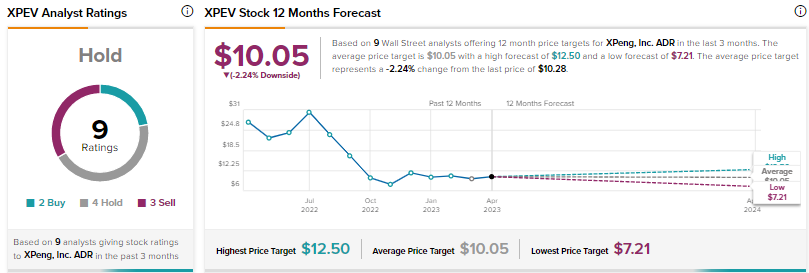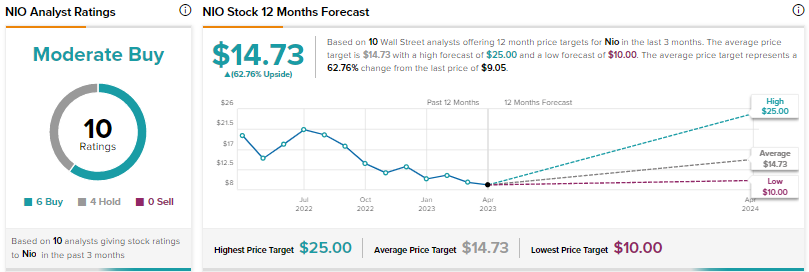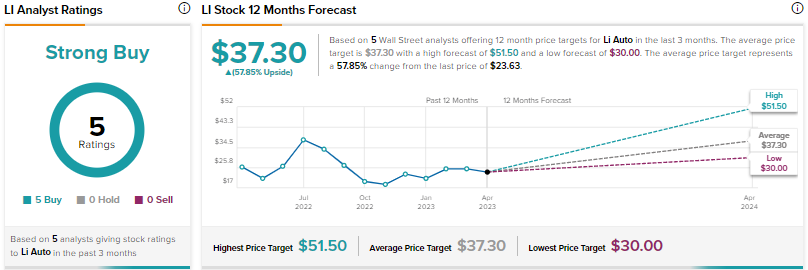The COVID-19 resurgence in China and the resultant supply chain disruption significantly hurt the electric vehicle (EV) market last year. Most EV makers in the world’s largest EV market have rebounded well since the easing of restrictions. Sales of new energy vehicles, including battery electric cars and plug-in hybrids, grew nearly 22% in March, accounting for 34% of the month’s car sales, as per the China Passenger Car Association. Nonetheless, macro pressures might weigh on near-term demand. With that thought in mind, we used TipRanks’ Stock Comparison Tool to place XPeng (NYSE:XPEV), Nio (NYSE:NIO), and Li Auto (NASDAQ:LI) against each other to pick the most attractive Chinese EV stock as per Wall Street analysts.

XPeng (XPEV)
XPeng delivered 7,002 vehicles in March, reflecting a 16.5% month-over-month growth. However, March deliveries slumped 54.5% year-over-year. This marked the seventh straight quarter of year-over-year decline.
Overall, the company delivered 18,230 EVs in Q1 2023, reflecting a notable decline of over 47% compared to the prior-year quarter.
Looking ahead, XPeng is optimistic about benefiting from the recently launched new P7i sports sedan, which is an upgraded version of its P7 model. The company also expects its G6 SUV, expected to be officially launched around the end of Q2 2023, to boost sales. XPeng anticipates its G6 monthly sales target to be 2 to 3 times that of its P7 predecessor sales. XPeng also plans to launch its new BEV 7-seat multi-purpose vehicle (MPV) in the second half of this year.
Is XPeng a Buy, Hold, or Sell?
Barclays analyst Jiong Shao reiterated a Hold rating and a price target of $8 after XPeng reported “weak” Q4 2022 results and provided subdued delivery guidance, noting that the company is going through a significant product transition and leadership changes.
Shao hopes for XPeng’s new models to take off later in the year and reaccelerate top-line growth. Nonetheless, he remains on the sidelines due to limited visibility of the company’s sales ramp or the potential success of its new models.
Wall Street is sidelined on XPeng, with a Hold consensus rating based on two Buys, four Holds, and three Sells. At $10.05, the average XPEV stock price target indicates a possible downside of 2.2%.

Nio (NYSE:NIO)
Nio’s March deliveries declined 14.6% from February but increased nearly 4% year-over-year to 10,378 vehicles. Further, the company’s Q1 deliveries of 31,041 rose 20.5% year-over-year but fell short of the midpoint of its own guidance of 31,000 to 33,000 vehicles.
Given Nio’s lofty deliveries target of 250,000 vehicles, the company will have to ramp up it production and sales in the remaining quarters. Meanwhile, the company aims to strengthen its battery swap network by adding 1,000 stations this year and achieve its goal of having more than 2.300 battery swap stations by the end of 2023.
Is Nio a Good Stock to Buy?
Last month, JPMorgan analyst Nick Lai downgraded Nio to Hold from Buy and reduced the price target to $10 from $14. Lai noted that the company’s Q4 2022 results were impacted by unexpected vehicle margin contraction and higher-than-expected spending.
Lai is concerned that Nio’s Q1 2023 margin could decline further while the expected improvement in Q2 2023 might lag the Street’s expectations, given the “challenging competition environment.” Further, the analyst also expressed concerns about the company achieving its “ambitious target” of 250,000 deliveries this year.
Barclays analyst Jiong Shao also downgraded Nio to a Hold from Buy, citing mounting losses, higher spending, and low margins.
The Moderate Buy consensus rating for Nio stock is based on six Buys and four Holds. The average price target of $14.73 suggests 63% upside potential.

Li Auto (NASDAQ:LI)
Li Auto delivered 20,823 vehicles in March, up nearly 89% year-over-year and 25% month-over-month. The company’s Q1 2023 deliveries increased 66% year-to-over to 52,584 units. It is worth noting that Li Auto delivered more vehicles in March as well as in Q1 2023 compared to XPeng and Nio.
The company boasts of capturing nearly 20% market share in the RMB300,000 to RMB500,000 SUV market in China. It expects to boost its sales with new launches this year, including Li L7 Air and Li L8 Air in April following the roll out of Li L7 Pro and Max in March.
What is the Price Target for LI Auto Stock?
Ahead of the Q1 update, Morgan Stanley analyst Tim Hsiao raised his price target on Li Auto to $30 from $23 and maintained an Overweight rating on the shares. Noted that Tesla’s (TSLA) price cuts in China triggered price competition, putting pressure on the first-half sales and margins of China’s EV makers.
While the analyst cut his earnings forecasts for the Chinese “EV trio” to reflect a more challenging operating backdrop, he remains bullish on the trio of Nio, XPeng, and Li due to solid balance sheet, pace of innovation, and valuation.
Wall Street’s Strong Buy consensus rating for Li Auto is based on five unanimous Buys. The average price target of $37.30 suggests nearly 58% upside from current levels.

Conclusion
While the future for Chinese EV makers looks promising, macro challenges and the ongoing price war might weigh on these companies over the near term. Given the weak deliveries over the recent months, Wall Street is sidelined on XPeng. Analysts are cautiously optimistic on Nio and see solid upside potential from current levels. Wall Street is more bullish on Li Auto and expects a similar upside on the stock as in the case of Nio.
"auto" - Google News
April 11, 2023 at 01:34PM
https://ift.tt/oIBQyrL
XPeng, Nio, or Li Auto: Which Chinese EV Stock Could Outpace its Peers? - TipRanks
"auto" - Google News
https://ift.tt/rPXtFqN
Shoes Man Tutorial
Pos News Update
Meme Update
Korean Entertainment News
Japan News Update
No comments:
Post a Comment